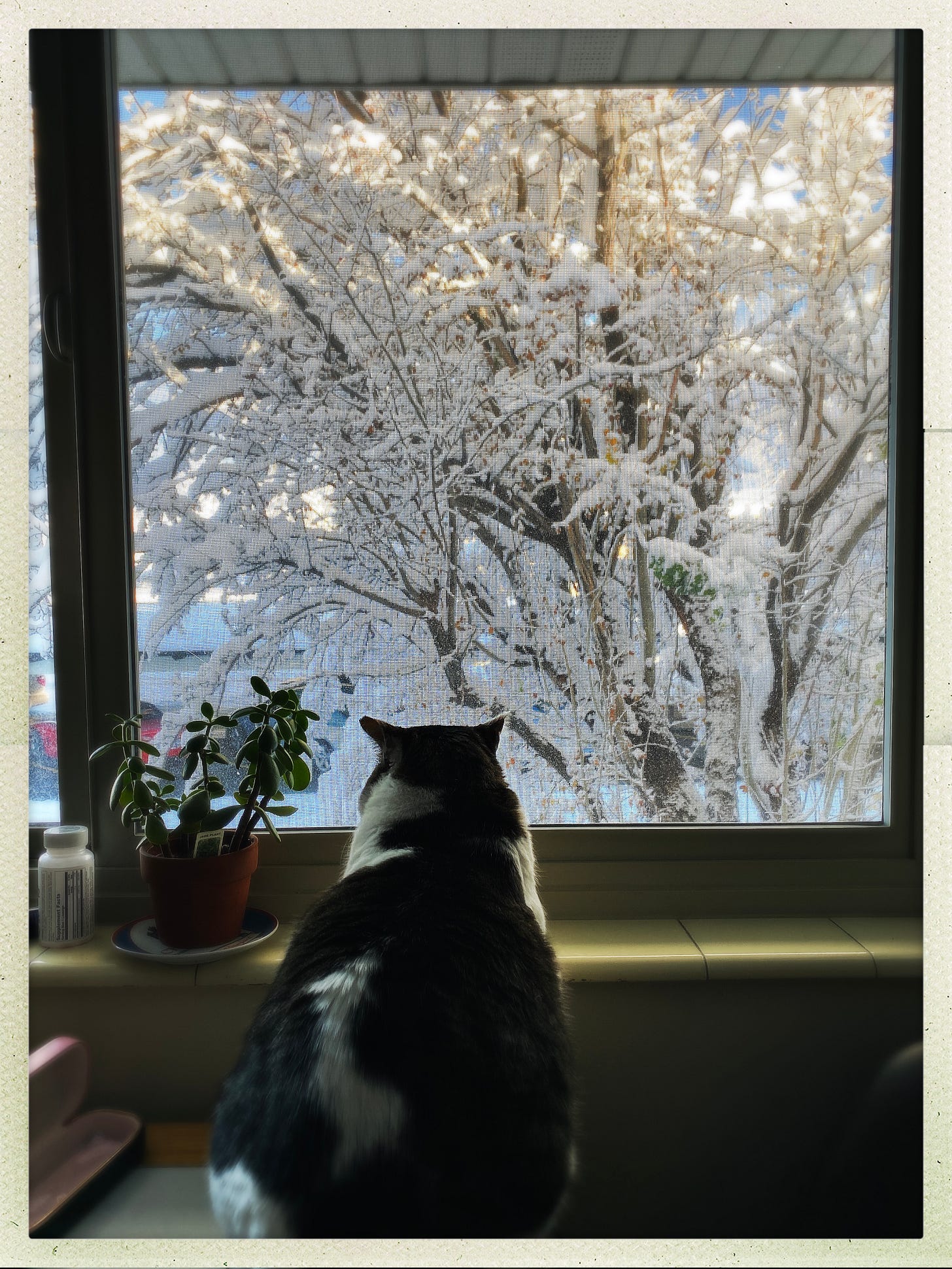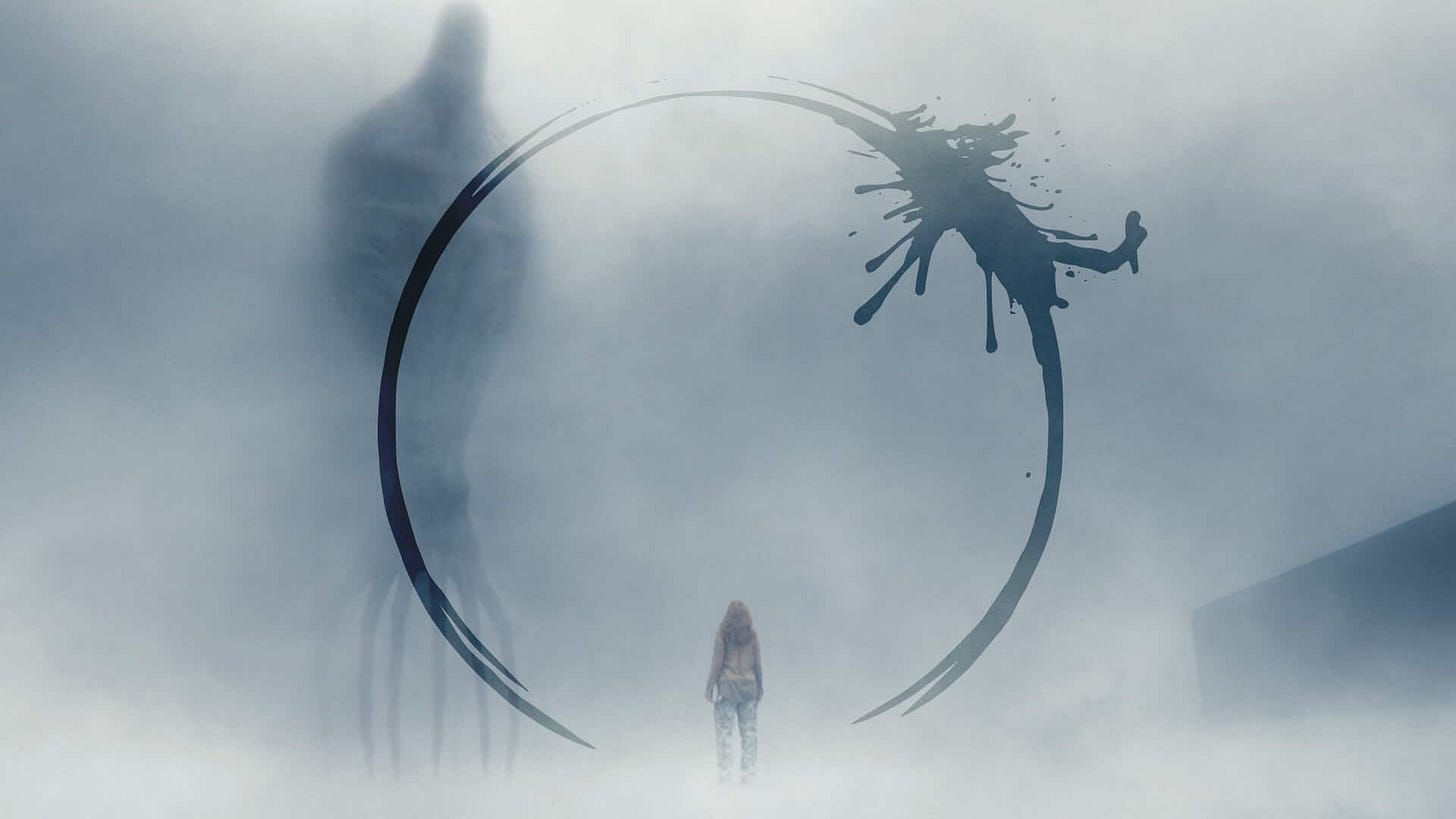What if time isn't what we think it is?
December
I’ve been thinking a lot lately about time.
It began when I started wondering how our cat experiences time. The cat and I have been in Salt Lake since mid-September, while my husband is still working in California. When he comes back for visits after being gone for weeks at at time, the cat is happy to see him but doesn’t act in such a way that leads me to believe he’s thinking, “Finally—where have you been for the last 23 days?”
On the other hand, if my husband and I both go out for a walk and are gone for an hour, the cat is ecstatic when we’re back.
Of course the cat doesn’t know about the Gregorian calendar. (Or that the Gregorian calendar is just one way of experiencing time in humanity’s relatively recent history.) He knows when it’s day and when it’s night, when he’s hungry, when it’s time to shed fur and when it’s time not to. He knows if we’re there or if we’re not there. But it’s not a steady, progressive march in one direction, not that he’s aware of.
Sometimes when I dream, the me in my dream is sure I’ve had the dream before. But I often wake up wondering if this is really true. If it’s not one of the recurring dreams I’ve talked or journaled about, how do I know if I’ve had it or not? Maybe my dream self is capable of experiencing the past and present at the same time.
In Denis Villeneuve’s movie Arrival, based on an even more complex Ted Chiang story, time isn’t linear. Time is language. Or language is time. And the language of the alien beings who’ve come to intervene on earth is circular, palindromic. In trying to learn this language, characters grieving the loss of a child are able to experience the joy of her being alive at the same time they’re grieving her death, even choosing to go through it all over again.
The other morning, during sleepless wee hours, we listened to the In Our Time episode about the history of Dickens’ A Christmas Carol. One of the guests, remarking on Scrooge’s sense of humor, recalled this portion of the text:
“You will be haunted,” resumed the Ghost, “by Three Spirits.”
Scrooge’s countenance fell almost as low as the Ghost’s had done.
“Is that the chance and hope you mentioned, Jacob?” he demanded, in a faltering voice.
“It is.”
“I—I think I’d rather not,” said Scrooge.
“Without their visits,” said the Ghost, “you cannot hope to shun the path I tread. Expect the first to-morrow, when the bell tolls One.”
“Couldn’t I take ’em all at once, and have it over, Jacob?” hinted Scrooge.
What if we could have the ghosts of past, present, and future all at once, just so we can—as painlessly as possible—get the big picture and change what we still have time to change? A client I’m working with is writing about time and playing with the idea of non-linear time in her novel in ways that ask some of these same questions.
Collectively, it’s all got me thinking that our subservience to the idea of linear time is actively making our experience of life worse than it needs to be. Right now, we’re measuring out months of Covid and wishing we could see the future or go back to a past where it isn’t happening. We think in years left in an administration or months until an election cycle with that same desire to fast forward or rewind. See also: climate change.
We might be counting days left on a job, the number of weeks we’re waiting to hear back on something important, the months until a next important medical test.
For Christians, the whole theme of this time of year is waiting. Arrival could have just as easily been titled Advent, as they mean the same thing. When I was a committed churchgoer, it wasn’t unusual to hear or say the phrase “already but not yet.” That was one way we talked about “the kingdom of God” we read about in the bible. Of course, being modern western people, we used this more by way of an explanation of something than a mystery to actively lean into.
As things we wish weren’t happening drag on, I’m wondering if we, if I, can change the experience of all this waiting and counting and measuring and clock-checking. Could I be more like my cat, who seems to experience some sort of passage of time but not as a finite and ever-shrinking measurement? Could I be like the me of my dreams, who can, in some remote corner of my brain, be in both the past and present at the same time? Could I get all the ghosts at once, a mystical glimpse at a big picture that gives me both clarity at what’s coming and a shot at changing it?
I think I would most like to be able to speak the alien language of Arrival. To see existence in eternal circles rather than measured lines, and escape from the backward and forwardness of it all in hopes of a world coming around to itself again and again, where there’s grief and joy coexisting at any spot on the dimension.
Writing Stuff
A Song Called Home (which you can pre-order now if you like) has gotten a couple of trade reviews this month, the kind of reviews a writer hopes for but sure doesn’t count on:
★ “…thoughtfully tackles tough issues like substance abuse, parental abandonment, the difficulties of change, and blended families. … A tender, honest, and beautifully written story about family, faith, and friendship.” — Kirkus, starred review
★ “…rich in small, acutely observed moments as well as complex and endearing characters. An exceptional, emotionally honest portrait of a tween navigating a blended family.” — Publishers Weekly, starred review
This past weekend, I posted the final episode of my podcast, This Creative Life, for 2021. I’ve really enjoyed having a regular co-host for The Launch Box series, and it’s got me wondering if I could re-imagine the podcast with a co-host or a series of co-hosts for 2022.
I’m finally closing in on the end of a draft of my next novel, a thing that I wasn’t sure would happen given all the burnout I (and everyone, as far as I can tell) have been feeling this year.
Recommendations
I’ve updated my Bookshop list of reading highlights of 2021.
This article about a floating green housing community in Amsterdam was really interesting, if pulsing with privilege. Hopefully as this technology develops, it won’t be only rich people who get to access it.
This Zoë Heller (who, I this second realized, is the author of the wonderful novel Notes on a Scandal) piece is from July, but I only recently read it. Interesting for anyone who has obsessed over cults or wondered if they are in one.
If you just don’t know what to get someone and it’s the last minute and they at all like to cook or eat, Snacking Cakes is a tried, true, and aesthetically pleasing cookbook. Yossy Arefi has basically taken quick breads, elevated them while keeping what’s easy and doable about quick breads, and turned me into a person who bakes a cake every weekend.
Arrival, obviously, and cats.
Since I’ve been doing poems to go with the newsletters this fall, I’ll leave you with this meditation on time by Janet Norris Bangs (1885-1971), whose bio simply says “American poet and housewife.”
Time
We crown you, Time, our hard relentless king
To dole out moments, spindrift of the sun.
While aeons brush us with unheeded wing,
We hoard our little minutes one by one.
Lamenting hours, we count the morning chime,
Protest the day with sundown, wearily.
Behold us, beggars at the feet of Time-
We who inherit all eternity!

